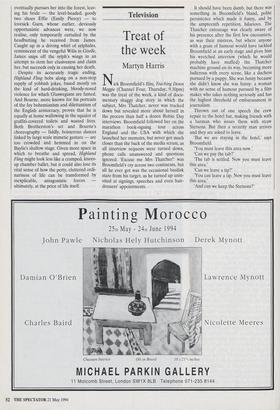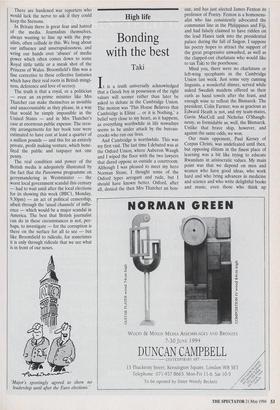Television
Treat of the week
Martyn Harris
ick Broomfield's film, Tracking Down Maggie (Channel Four, Thursday, 9.30pm) was the treat of the week, a kind of docu- mentary shaggy dog story in which the subject, Mrs Thatcher, never was tracked down but revealed more about herself in the process than half a dozen Robin Day interviews. Broomfield followed her on the marathon book-signing tour across England and the USA with which she launched her memoirs, but never got much closer than the back of the media scrum, as all interview requests were turned down, phone calls unanswered and questions ignored. 'Excuse me Mrs Thatcher!' was Broomfield's cry across two continents, but all he ever got was the occasional basilisk stare from his target, as he turned up unin- vited at signings, speeches and even hair- dressers' appointments. It should have been dumb, but there was something in Broomfield's bland, polite persistence which made it funny, and by the umpteenth repetition, hilarious. The Thatcher entourage was clearly aware of his presence after the first few encounters, as was their mistress, but where anyone with a grain of humour would have tackled Broomfield at an early stage and given him his wretched interview (which he would probably have muffed) the Thatcher machine ground on its way, becoming more ludicrous with every scene, like a duchess pursued by a puppy. She was funny because she didn't know she was funny: a woman with no sense of humour pursued by a film maker who takes nothing seriously and has the highest threshold of embarassment in journalism.
Thrown out of one speech the crew repair to the hotel bar, making friends with a barman who issues them with straw Stetsons. But then a security man arrives and they are asked to leave.
'But we are staying in the hotel,' says Broomfield.
'You must leave this area now.'
'Can we pay the tab?'
'The tab is settled. Now you must leave this area.'
'Can we leave a tip?'
'You can leave a tip. Now you must leave this area.'
'And can we keep the Stetsons?' There are hardened war reporters who would lack the nerve to ask if they could keep the Stetsons.
In Britain there is great fear and hatred of the media. Journalists themselves, always wanting to line up with the pop- ulists, often collude in this. We brag about our influence and unscrupulousness, and wring our hands over 'abuses' of media power which often comes down to some Royal tittle tattle or a sneak shot of the Princess of Wales. Broomfield's film was a fine corrective to these collective fantasies which have their real roots in British mingi- ness, deference and love of secrecy.
The truth is that a royal, or a politician — even an ex-prime minister like Mrs Thatcher can make themselves as invisible and unaccountable as they please, in a way that would be simply impossible in the United States — and in Mrs Thatcher's case at enormous public expense. The secu- rity arrangements for her book tour were estimated to have cost at least a quarter of a million pounds — and this for an entirely private, profit making venture, which bene- fited the public and taxpayer not one penny.
The real condition and power of the British media is adequately illustrated by the fact that the Panorama programme on gerrymandering in Westminster — the worst local government scandal this century — had to wait until after the local elections for its showing this week (BBC1, Monday, 9.30pm) — an act of political censorship, albeit through the 'usual channels' of influ- ence — which would be a major scandal in America. The best that British journalist can do in these circumstances is not, per- haps, to investigate — for the corruption is there on the surface for all to see — but like Broomfield to ridicule, for sometimes it is only through ridicule that we see what is in front of our noses.
'Major's sportingly agreed to show no leadership until after the Euro elections.'





































































 Previous page
Previous page